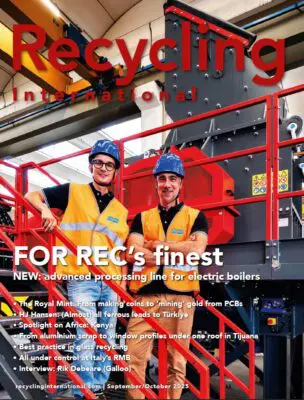22
COUNTRY REPORT
Overcoming ‘nappy
mountain’
A baby needs between six and ten disposable nappies a day. Multiply that world-
wide and the result is a staggering 250 million. Most end up in landfills or are
incinerated, releasing toxins. Seeing this problem up close sparked an idea for
Nairobi-born chemist Melvin Mwambu Kizito.
Dandora landfill, in Kenya’s capital,
was officially declared ‘at capacity’
more than 20 years ago. And yet,
mountains of used nappies are still a
visible and smelly reality. Kizito
laments these are among the most dif-
ficult products to recycle. They make
up to 4% of municipal solid waste,
take centuries to break down and are
rarely collected separately.
In Kenya alone, around 800 million
nappies are used every year, nearly all
of which are dumped in open landfills.
Global demand is still growing, with
the market exceeding EUR 65 billion
annually.
STUDENT IDEA
‘I first became aware of the problem
when taking care of my niece,’ Kizito
recalls. ‘Kenya doesn’t have weekly
garbage collection. I was shocked by
the pile of diapers behind the houses.
I asked myself: as chemists, how can
we find a scalable solution?’
With two fellow students, Kizito began
experimenting with ways to process
them into biofuel. Their idea gained
global attention. In 2020, the team
entered ClimateLaunchpad, a Dutch
innovation contest, and won first
place. ‘It showed us this wasn’t just a
crazy idea. There was real interest.’
BE BOLD
The pandemic slowed progress but
Kizito kept pushing. In 2021, Alkyl
Recycling was selected for the interna-
tional No Waste Challenge, which
brought him to Amsterdam for a boot-
camp with other start-ups and inves-
tors. The trip opened his eyes to
Europe’s start-up infrastructure. With
support from InnovationQuarter, he
joined the YES!Delft incubator, gaining
access to mentors, labs and potential
partners.
His college mentor at home in Nairobi
encouraged him to take the leap: ‘He
said: “Fortune favours the bold. If it
doesn’t work out, you can always
come back home. At least you tried.”’
SCALING UP
Based in both Kenya and the
Netherlands, Kizito is refining Alkyl’s
technology. The process uses sustain-
able chemistry to sterilise and sepa-
rate the nappy components of plastics,
cellulose fibres and superabsorbent
polymers but without the high energy
demands of incineration. Conversion
rates exceed 85%, producing clean
secondary raw materials.
The potential applications are wide-
ranging. Recovered cellulose can go
into paper, textiles, coatings or bio-
based chemicals. Polypropylene and
polyethylene can be remoulded into
new plastics. Superabsorbent poly-
mers can find a second life in cement
additives, adhesives or cable coatings.
‘Through innovative experimentation,
we are pushing the boundaries of
what’s possible in diaper recycling,’
Kizito says. ‘Our goal is to make dia-
per recycling feasible, scalable and
affordable so society can continue to
enjoy the benefits of these products
without polluting the environment.’
If Alkyl succeeds, one of Kenya’s most
stubborn waste streams may be trans-
formed from a burden into a resource
– with lessons for the world.
Melvin Mwambu Kizito: ‘We are pushing the boundaries of what’s possible in diaper
recycling.’
16-17-19-20-21-22_africa_kenya.indd 22 09-09-2025 09:41




